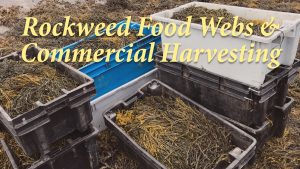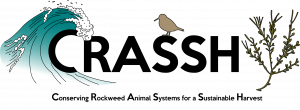Amanda Klemmer, Assistant Research Professor of Food-web Ecology, School of Biology & Ecology, UMaine
 The productivity of Maine’s coastal ecosystems is a keystone of the state’s natural resources based economy, with Maine’s coastal fisheries and tourism both billion-dollar industries. Sustainably managing these growing industries, to shepherd them through an uncertain ecological future, requires a mechanistic understanding of their associated food webs and ecosystems. Unlike most fisheries, rockweed harvesting removes basal resources, potentially altering habitat structure and creating bottom-up effects that cascade up food webs reaching top-consumers of conservation and general public interest, such as birds. The combination of economic value, potential conservation impacts, and public interest make rockweed habitats a unique system to study food-web dynamics that support ecosystem services in marine, intertidal ecosystems. However, essential to implementing and maintaining sustainable management of any fishery is identifying gaps in knowledge, gathering informative data, promoting stakeholder knowledge, engagement and ownership, and widely disseminating educational material. The CRASSH (Conserving Rockweed and Animal Systems for a Sustainable Harvest) team is working towards integrating novel scientific findings with stakeholder and public engagement to address the complex issue of rockweed harvest along the coast of Maine.
The productivity of Maine’s coastal ecosystems is a keystone of the state’s natural resources based economy, with Maine’s coastal fisheries and tourism both billion-dollar industries. Sustainably managing these growing industries, to shepherd them through an uncertain ecological future, requires a mechanistic understanding of their associated food webs and ecosystems. Unlike most fisheries, rockweed harvesting removes basal resources, potentially altering habitat structure and creating bottom-up effects that cascade up food webs reaching top-consumers of conservation and general public interest, such as birds. The combination of economic value, potential conservation impacts, and public interest make rockweed habitats a unique system to study food-web dynamics that support ecosystem services in marine, intertidal ecosystems. However, essential to implementing and maintaining sustainable management of any fishery is identifying gaps in knowledge, gathering informative data, promoting stakeholder knowledge, engagement and ownership, and widely disseminating educational material. The CRASSH (Conserving Rockweed and Animal Systems for a Sustainable Harvest) team is working towards integrating novel scientific findings with stakeholder and public engagement to address the complex issue of rockweed harvest along the coast of Maine.
 Amanda Klemmer is a food-web ecologist who works on the connections between terrestrial and aquatic ecosystems and how they affect food-web interactions, like trophic cascades. She did her undergraduate degree at Allegheny College. During her undergraduate program, she had the opportunity to work on ecological research in the deciduous forests of Pennsylvania, the Rocky Mountains in Colorado, and the Southern Alps in New Zealand on topics ranging from human impacts on agricultural streams to salamander and invertebrate populations in ponds on nature reserves. She firmly believes it was her exposure to a variety of world-class research during her undergraduate program that launched her ecological career. Klemmer received a M.Sc. at the University of British Columbia working in temperate rain forests on connections between forest, stream, and lake communities. She then moved on to the University of Canterbury to do her Ph.D. on terrestrial/aquatic meta-ecosystems and how subsidies affect trophic cascades. Klemmer is part of a UMaine team working on the Dragonfly Mercury Project looking at accumulation of mercury in dragonfly larvae at over 60 National Parks across the US. She is also involved in a long-term project with the EPA looking at recovery of lakes from acid rain. Lastly, she has a new project underway to identify food-web connections between rockweed, invertebrates, and birds in the rocky intertidal zone in light of commercial rockweed harvesting.
Amanda Klemmer is a food-web ecologist who works on the connections between terrestrial and aquatic ecosystems and how they affect food-web interactions, like trophic cascades. She did her undergraduate degree at Allegheny College. During her undergraduate program, she had the opportunity to work on ecological research in the deciduous forests of Pennsylvania, the Rocky Mountains in Colorado, and the Southern Alps in New Zealand on topics ranging from human impacts on agricultural streams to salamander and invertebrate populations in ponds on nature reserves. She firmly believes it was her exposure to a variety of world-class research during her undergraduate program that launched her ecological career. Klemmer received a M.Sc. at the University of British Columbia working in temperate rain forests on connections between forest, stream, and lake communities. She then moved on to the University of Canterbury to do her Ph.D. on terrestrial/aquatic meta-ecosystems and how subsidies affect trophic cascades. Klemmer is part of a UMaine team working on the Dragonfly Mercury Project looking at accumulation of mercury in dragonfly larvae at over 60 National Parks across the US. She is also involved in a long-term project with the EPA looking at recovery of lakes from acid rain. Lastly, she has a new project underway to identify food-web connections between rockweed, invertebrates, and birds in the rocky intertidal zone in light of commercial rockweed harvesting.


